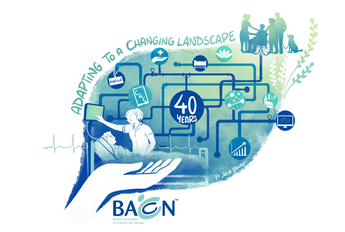November Twitter Chat report #EWS
8th Nov 2019
BACCN November 2019 Twitter Chat: #EWS
Well, the twitter chat regarding Early Warning Scores was the most fast paced I @credland_nicki have done so far!!! A massive thank you to everyone who took part. Studies suggest that there is a positive relationship between improved outcomes (cardiopulmonary arrest, mortality, serious adverse events, length of hospital stay, hospital admissions, observation frequency, ICU/HDU admission) and implementation of an Early Warning Score protocol. There is a mixed trend with conflicting results regarding length of stay and cardiopulmonary arrest data. So what did you think?
We talked about what the most important factors are in recognising a deteriorating patient. The key themes were correctly completed vital signs as part of a comprehensive assessment, manual completion of BP and HR, the importance of the "end of bed" assessment and knowledge and experience of the staff undertaking the assessment. "Taking the obs" is often just seen as a task rather a vital part of clinical assessment. We talked about "who" should do the EWS and it was felt that, as long as full training was provided, it did not matter if this was a registered nurse or not. However, provision of recognition and response courses for both registered and unregistered staff such as ALERT / BEACH sounds patchy across the country with some Trusts doing this online or "added onto" BLS/ILS. This means poor compliance or lack of access to this training.
Compliance with EWS is a significant problem. Research suggests that there is evidence of decreased compliance if very high EWS, incomplete EWS and incorrectly calculated EWS. Some of the reasons for this poor compliance we discussed were workload, competing priorities, high patient turnover, stress, lack of education, lack of confidence, workplace culture and lack of true understanding why we complete EWS. It is often seen as "another piece of paper" and there needs to be a greater appreciation for what is actually happening physiologically when interpreting assessment and observation findings
So what's the answer? If we accept that EWS play a role in helping us to identify deteriorating patients then we need to question why compliance remains poor and explore evidence based strategies to improve this. Just telling staff to do it is not acceptable. Junior staff feel uncomfortable referring a patient to the doctor or to critical care for fear of looking stupid.This is so vital to any team responding to the deteriorating patient. It should be made as easy as possible for people to escalate any concerns and or raised NEWS regardless of situation and or location of the patient
@credland_nicki; Chair BACCN
Please find a Wakelet summary of all the #EWS twitter activity that can be used for revalidation purposes https://wke.lt/w/s/E3yAIO
Our next Twitter Chat will be taking place on the 11th of December when we'll debate "Pet therapy: Pro or Con". Watch this space for more information.
Let's keep the conversation going
@karin_gerber
BACCN National Board




